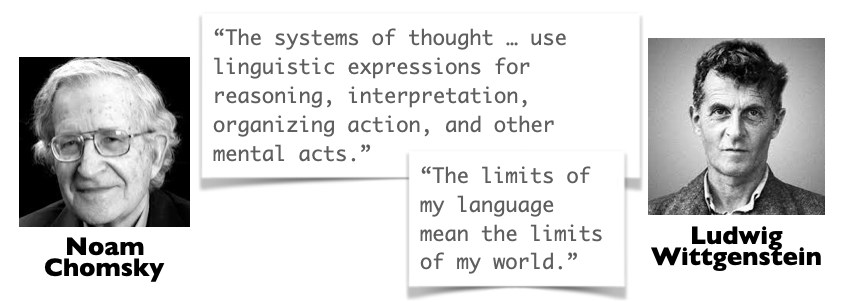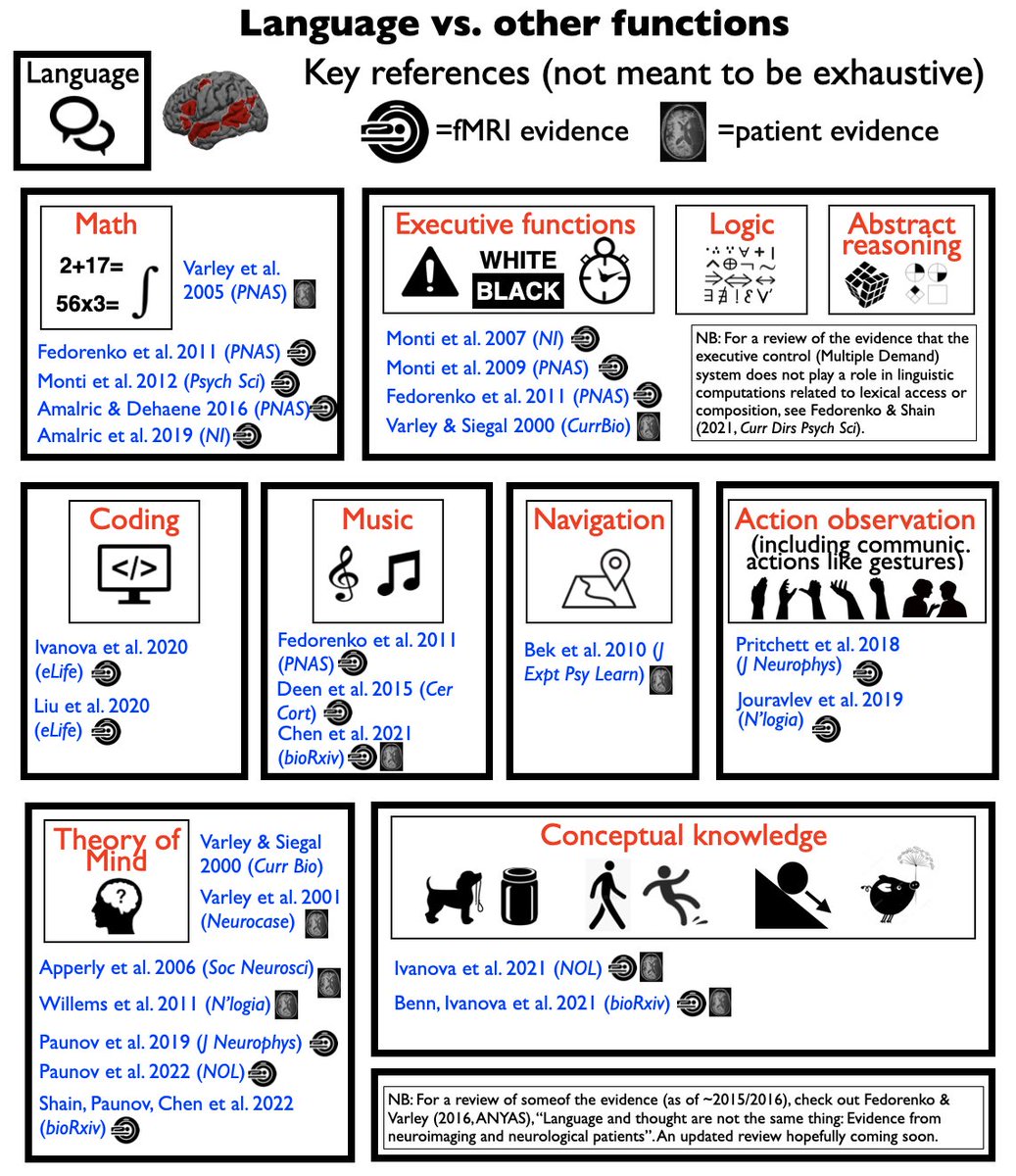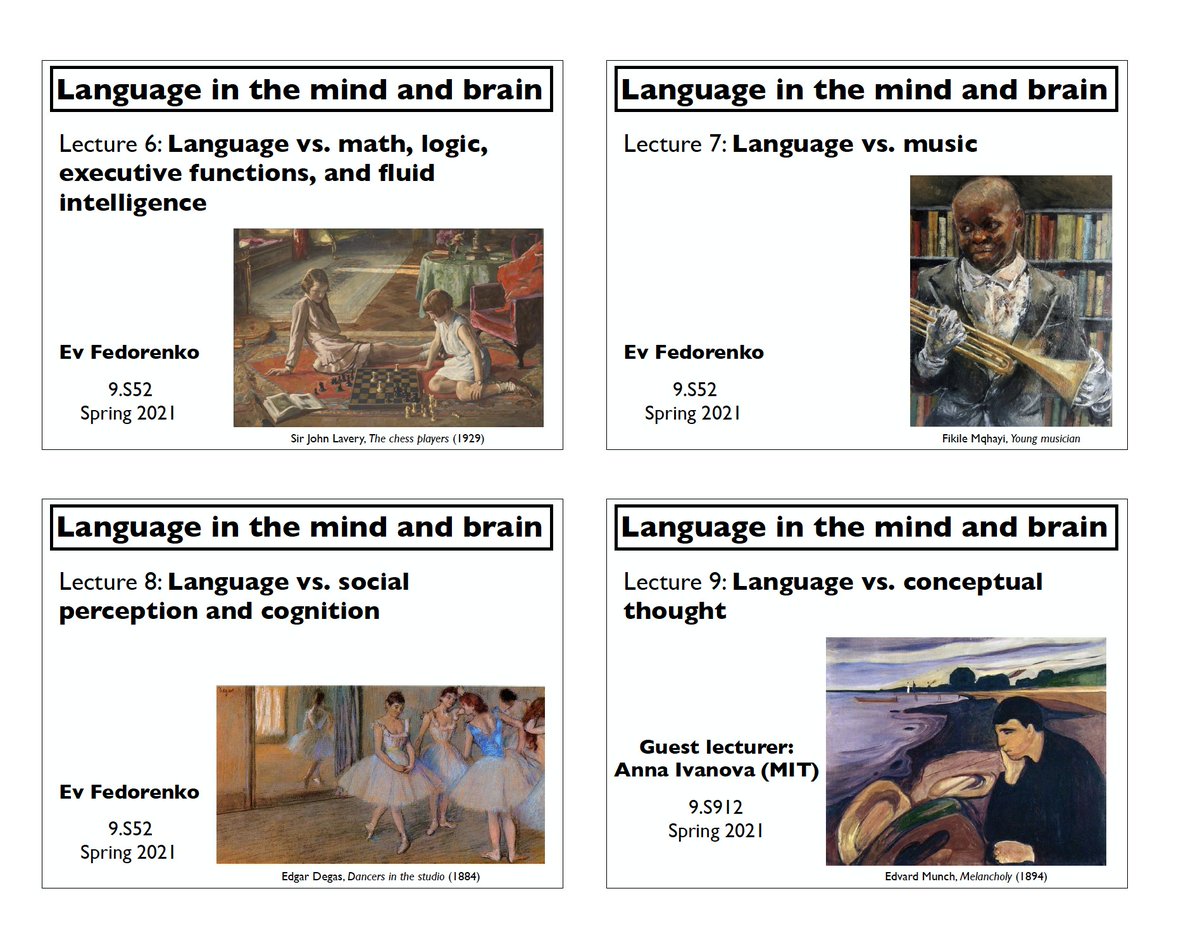
As promised, a🧵on language and thought. The relationship between language and thought has long been pondered and debated. It may be one of the deepest and most exciting questions in cognitive science. 1/n
Ray Jackendoff sets up this question beautifully in his 1996 book (he proceeds to argue for the relative independence between the two). 2/n 

Many, however, have argued that language is at the very core of complex thought: Chomsky and Wittgenstein most famously perhaps. 3/n 

Let’s unpack what one may mean when talking about the *relationship* between language and thought.
Several distinct questions have been asked about these capacities.
Q1️⃣: Do language and (some aspects of) thought/cognition draw on the same machinery?
4/n
Several distinct questions have been asked about these capacities.
Q1️⃣: Do language and (some aspects of) thought/cognition draw on the same machinery?
4/n
Q2️⃣: Is language necessary for developing our capacity to think?
Q3️⃣: Does language affect how we perceive and/or think (once our brain is mature)?
Q4️⃣: Does the particular language we speak (e.g., Russian or Tamil or Mandarin, etc.) affect how we perceive and/or think?
5/n
Q3️⃣: Does language affect how we perceive and/or think (once our brain is mature)?
Q4️⃣: Does the particular language we speak (e.g., Russian or Tamil or Mandarin, etc.) affect how we perceive and/or think?
5/n
All these qs are exciting. I have mostly worked on Q1️⃣–the q that brought me to cogneuro (and to @Nancy_Kanwisher), as it cannot be straightforwardly answered with behav. approaches.
I would say we have a definitive answer to Q1️⃣. The ans is NO — I review the evidence below.
6/n
I would say we have a definitive answer to Q1️⃣. The ans is NO — I review the evidence below.
6/n
Q2️⃣ is challenging to address, but based on what we know from kids growing up without access to lang, I would say the answer is LARGELY NO (with the intriguing exception of Theory of Mind reasoning). Q3️⃣ and Q4️⃣ remain controversial. I say a few words about those at the end.
7/n
7/n
Evidence that lang and thought draw on distinct machinery comes from 2 main approaches: i) 🧠 imaging, and ii) patient investigations. Using 🧠 imaging (e.g., fMRI), we can look at the response of the lang brain areas to different non-linguistic conditions, to ask:
8/n
8/n
Do brain areas that work hard when we understand and produce language also work hard when we engage in non-linguistic cognitive tasks?
9/n
9/n
Claims have been made about overlap between lang and many non-ling functions: e.g.,see Dehaene etal.1999 for a claim about lang-math overlap, or Novick etal.2005 for a claim about overlap between lang and exec. ctrl, or Maess etal.2001 for a claim about lang-music overlap.
10/n
10/n
BUT: these claims have drawn on evidence that does not unambiguously support overlap. When rigorous within-subject analyses are used, none of these (or other) non-ling functions overlap with lang: the lang system is ~silent unless we process lang (see fig in 15/n below).
11/n
11/n
Further, using data from patients with 🧠 damage, we can ask whether ling deficits lead to deficits in other domains. Most informative are cases of individuals with severe ling impairments (‘global aphasia’) as a result of extensive damage to the Perisylvian cortex.
12/n
12/n
Such patients have essentially lost all their production and comprehension abilities. The amazing Rosemary Varley (UCL) has been studying this population for many years, asking: can these patients still perform various non-linguistic cognitive tasks?
13/n
13/n
E.g., can they do math? solve logic puzzles? appreciate music? understand what someone is thinking? It turns out that the answer is YES to all these qs. The only thing these patients lack is the ability to convert abstract conceptual representations into a verbal format.
14/n
14/n
Here are some key references, organized by domain (for the fMRI work, most, though not all, studies rely on individual-subject analyses):
15/n
@IbanDlank @ampaunov @neuranna @HopeKean @OlessiaJour @raryskin @coryshain @tamaregev @ZachMineroff @saima_mm @Jessica_ChenXY +others ❤️
15/n
@IbanDlank @ampaunov @neuranna @HopeKean @OlessiaJour @raryskin @coryshain @tamaregev @ZachMineroff @saima_mm @Jessica_ChenXY +others ❤️

Ok, so language and thought are distinct in the mind and brain, supported by non-overlapping mechanisms, but what about Qs3️⃣and4️⃣? Does access to linguistic representations in general, or in a particular language, affect how we perceive and think about the world?
16/n
16/n
FWIW, my take on that lit is that—to the extent such effects exist—they are subtle, and lang does not fundamentally change the underlying perceptual/conceptual structures (of course, if you can use lang to solve a task, you'll do that).
17/n
17/n
Of course, the fact that lang and thought are distinct does not imply that lang cannot facililate our learning and thinking. Certainly, it is easier to learn math if someone can just explain to you how to do it, but:
18/n
18/n
the fact remains that language is not essential for acquiring or employing most non-linguistic capacities.
19/19
19/19
P.S. Some people say: well, maybe what you (Ev) call lang is just "externalization", and what e.g., Chomsky meant is some earlier stage. And sure, if you redefine language as thought (earlier stage), then yes, they are the same, but of course, the claim is then vacuous.
20/20
20/20
• • •
Missing some Tweet in this thread? You can try to
force a refresh









